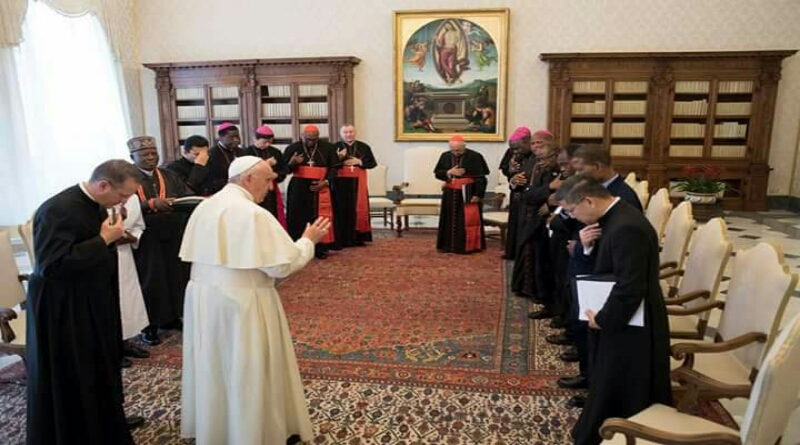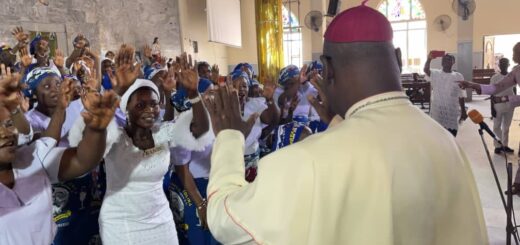I Am the Vine; You Are the Branches
by ARCH BISHOP · May 2, 2021
Fifth Sunday of Easter, Year B, Homily by Archbishop Ignatius A. Kaigama at St. Anthony Jabi. 2 May 2021.
Readings: Acts 9: 26-31; Ps 22: 26-27, 28, 30, 31-32; 1 Jn. 3: 18-24; Jn. 15: 1-8
“I am the vine; you are the branches” (John 15:5)
The New Testament uses some images describing the union of Christ with His followers, such as the body and its members (cf. 1 Cor. 12), the bridegroom and bride (cf. Eph. 5:25-33). Last Sunday our reflection was on the Good Shepherd and the sheep (cf. Jn. 10). This Sunday, our attention is drawn to Jesus as the Vine and we, the branches. As the branches are united to the vine, and receive their life from it, so also is the life of the Christian totally dependent on Jesus and bears fruit only when it remains grafted to Christ who is the true Vine.
In the Old Testament, the image of the vine is a reference to the People of Israel (cf. Hos. 10:1). According to Psalm 80:8, Israel is the vine that the Lord brought out of Egypt and drove out the nations to plant it. Isaiah spoke of the house of Israel as the ‘vineyard of the Lord’ (cf. Is. 5:7). Jeremiah said that God planted Israel ‘as his choice vine’ (cf. Jer. 2:21).
With the coming of Jesus, we are a new people formed through baptism, and as long as we are fully connected to Jesus, the source of life, we will have life in abundance and bear maximum fruits.
In today’s first reading, we hear of the dramatic conversion of Paul who had been a fierce persecutor of the early believers. He arrested many and even supervised the killing of Stephen the deacon. After his encounter and life changing experience with Christ on the way to Damascus, he was transformed from Saul the persecutor, to Paul the preacher of the Good News. Paul became deeply grafted and rooted in Christ, the true Vine. He wrote of himself: “It is no longer I who live, but it is Christ who lives in me” (Gal. 2:20).
In the Second reading, John reminds us that the precondition for living in Christ is keeping God’s commandments (cf. 1 Jn. 3:24) and living out God’s word, leading us to works of charity and mercy such as feeding the hungry, caring for the sick, sheltering the homeless, and giving alms to the poor.
In the Gospel, Jesus declares: “I am the vine, and you are the branches…. Whoever remains in me and I in him will bear much fruit, because without me you can do nothing” (Jn. 15:5). By this, Jesus means that He is our “life-line,” the only way we can truly find life, to be fruitful, to be happy and to be able to give hope to others.
Today, we arrogantly feel that we are masters of creation and of ourselves, and those who are comfortable think that only the poor should worry about God or religion. Some remember God only when they are in trouble like the Prodigal Son (cf. Lk. 15:11-13). Some cut off themselves from God during difficult moments. Some live very ungodly lives and yet, expect the world to love and respect human lives and human rights.
The branches that do not bear good fruits are the nominal or indifferent Christians among us. They are tied to Jesus only by an outward profession. The kind of fruits they bear are what St Paul enumerates in Galatians 5:19-21: immorality, impurity and shamelessness, idol worship and magic, hatred, jealousy, violence, anger, ambition, division, factions, envy, drunkenness, orgies and the like.
Nigeria is reckoned as one of the most religious nations on earth. Our places of worship are often filled with worshippers, but our daily actions reflect a wide discrepancy from the tenets of the religions we profess. Despite our religiosity, we continue to witness an acute rise in the numbers of terrorists, bandits, kidnappers and militants, not to talk of corrupt officials. We price evil over good, laud violence over peace and personal economic interests over collective nation building.
Lucy, a member of the Catholic Youth Organization making post communion announcements on the Vocations Sunday when I visited Holy Ghost parish, Saburi, impressed me when she innocently and charmingly told the congregation that there are four categories of parishioners: those who make things happen; those who watch things happen, those who do not know what is happening and those whose words and actions hinder anything good from happening.
In the face of rising challenges of all kinds in our nation, we feel duty bound to ask if those who represent our collective interests in the Presidency, Senate, House of Representative, etc., do make the dividends of democracy come to us or they are only experiencing the fruits of democracy in their pockets and with their families and friends instead of all Nigerians. We are faced with consuming insecurity, excruciating poverty, spiralling unemployment and the arbitrary destruction of human lives. It is very painful and shameful that a country blessed with abundant resources, so endowed with intellectuals, professionals of eminent credentials, and a hard working people should suffer the kind of crippling poverty and social deprivation that give birth to multidimensional violence.
We should ask God for the grace of renewal, fruitful governance and a godly management of our resources, devoid of individualism, nepotism, bigotry, etc.
The Holy Father is requesting that during this month of May, the month of Mary, the entire Church should invoke the intercession of the Blessed Virgin Mary for the end of the Corona Virus Pandemic; to specially remember those most affected by the pandemic by praying the Holy Rosary personally and to link up to Catholic Shrines around the world where prayers will be going on.
My dear parishioners of St. Anthony’s Parish, Jabi, let us be united in fervent prayers. May God bless and keep you spiritually and physically well.




